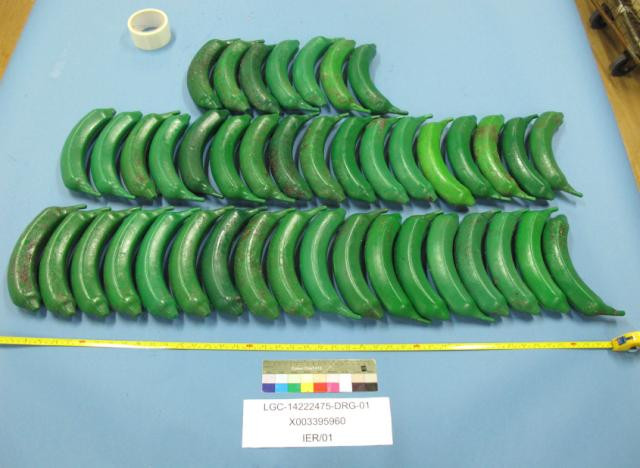Cocaine found hidden among bananas for third time this month
In the past few years, cocaine has been found hidden in fruit containers all across Europe.
Spanish authorities have confiscated a total 17kg (37lbs) of cocaine stuffed in fake and real bananas, in the latest bust against the drug trafficked from Latin America to European shores.
10kg of the powder was hidden among 57 fake bananas and another 7kg in cardboard boxes containing real bananas in Valencia and Malaga. The investigation by the Spanish authorities, dubbed operation Split – possibly in reference to the popular banana ice-cream dessert – led to the arrest of two men. A Spanish and an Italian citizen, and a man of Italian origin have been detained due to their involvement in drug trafficking and organised crime.
This cocaine seizure is the third of its kind this month (March). A major bust occurred accidentally in Italy on 14 March, when a shipment carrying 110kg of cocaine, hidden among banana and vegetable containers from Colombia, was intercepted by the authorities as it was sent to the wrong harbour. The shipment was supposed to reach Sicily, but instead arrived in the Salerno harbour in Campania. At current prices, the drug would have earned €14m (£12m, $15m) if sold on the streets.
On the same day, Russian authorities intercepted 18kg of cocaine at the harbour in St Petersburg, another location that has a history of finding the drug trafficked among fruit and vegetable shipments from Ecuador, having found cocaine in at least two other occasions, in 2013 and 2010.
In the past few years, cocaine has been found hidden in fruit containers all across Europe, either as part of police operations seizing containers at the harbours, such as the 8 tons discovered in the Belgian port of Antwerp in 2012 or the 2.3tons of cocaine discovered in Romania's Black Sea port of Constanta in 2016. In February 2017, 360kg of cocaine washed up on a beach in Norfolk, England.
There have even been surprise discoveries at major supermarket retailers. Past discoveries of cocaine among bananas involve Coop in Denmark in 2013, when the packaged drug was discovered at three separate supermarket locations, Colruyt in Belgium in 2013, twice at Aldi in Germany in 2014 and 2015, and also Lidl in Czech Republic and Tesco in the UK in 2015.

Banana shipments are only one way to conceal the drug. In an article written for the Italian weekly Espresso a decade ago, journalist Roberto Saviano, who has written extensively about organised crime and cocaine trafficking in his best-selling books Gomorrah and Zero Zero Zero, also mentioned canned pineapple as a potential hideout – with the coke packaged in between slices.
The drug has also been uncovered in cars, with coke concealed insides electric wires. Most recently, US authorities discovered cocaine packed in the nose cone of planes that had departed from Colombia, the world's largest producer of cocaine. The Sicilian mafia was also found to have used ambulances and a funeral home to traffic the drug.
An international operations to hit the Colombian drug smuggling network led to the recovery of 8 tons of cocaine at a banana plantation in May 2016, the country's largest drug seizure to date, and the consequent arrest of eight people in Spain and Italy. According to Saviano and other experts, international cooperation is not only crucial to tackle drug trafficking, but also to target the funding network through which criminal organisations in Italy, and across the world, dominate the illegal market.
© Copyright IBTimes 2025. All rights reserved.




















